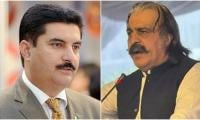Under a well-thought-out plan, the powers that be distorted Pakistan's political history. The current curriculum taught in universities, colleges and schools does not encapsulate the true history of the country.
Former Senate chairman and incumbent Pakistan Peoples Party (PPP) senator Raza Rabbani made these remarks on Saturday as he spoke as the chief guest at the launch of journalist Mazhar Abbas's book 'Selector Se Selected Tak'.
The book, which is a collection of the journalist’s opinion pieces, was launched at a packed-to-capacity auditorium of the Arts Council of Pakistan (ACP).
Rabbani called the book a genuine history book. “For the youth who want to acquaint themselves with the true history, Mazhar's book holds the status of a milestone," he remarked.
The senator lamented that for a long time, we had been levelling allegations against each other and this tradition would continue in the future. "Today, Pakistan stands at a precipice where people like you [audience], who represent the cream of intellectuals, must acknowledge that to navigate the country out of this crisis, initiating a national debate is imperative."
He said that from the East India Company’s time to the present day, the political landscape had continued to operate under the influence of various forms of selection and selectors. Though, he said the British Raj, which controlled Pakistan's landed aristocracy, came to an end, the colonial mindset and the effects of colonisation still persisted even today.
"Pakistan's political system is akin to a caste system where those having brute force and raw power govern and are considered the Brahmin of this caste and those who don't have it are relegated to the lowest rung of this system," he opined.
"The path to resolving all these issues is through a national dialogue, and it is often asked that if a national dialogue is to be initiated, who will take the lead. Parliament, especially the Senate, is present to initiate a national dialogue. It has a 'committee of the whole' where the entire house transforms into a committee and can summon anyone. All stakeholders should be invited to this committee to initiate a dialogue. In 2017, during my tenure as the Chairman of the Senate, we convened the committee of the whole and invited the Chief of Army Staff and DG ISI, both of whom attended,” he stated.
He recalled that the Chief Justice of Pakistan had also participated in a separate meeting of the house. Changing the mindset was the most important thing, Rabbani said, adding that until that change was accepted by all stakeholders, it is unlikely to happen.
Civil society and intellectuals could bring about this change through pressure, the senator opined.
About the title of this book, Selector Se Selected Tak, Abbas said these words were once used rarely in the discourse on the country’s politics, but over the years, there had been an increase in their usage. Terms like 'umpire' and 'playing on both sides of the wicket' also became part of the political discourse, he stated, adding that all the terms from cricket became relevant because a person from cricket entered politics.
There was a great desire when we were students to see a flourishing and robust democracy in this country, Abbas said. He mentioned journalists like Nisar Osmani and Paikar Naqvi whose struggle for press freedom he witnessed. “I learned a lot from Nisar Osmani. One lesson he imparted was that 'the truth is what is spoken at the right time' and he courageously spoke the truth even in the face of challenging circumstances."
Calling such journalists the pride of journalism, Abbas said they struggled for press freedom because they believed, and made us believe as well, that democratic freedom was impossible without freedom of the press.
"How press freedom is possible in a country where there is no democracy?" the author asked.
Commenting on the history of Pakistan, he said the first selector in the country was Ayub Khan, who selected himself, and then the trend of selection continued. “At times, selectors would choose themselves, and at other times, they would select their preferred team. If they didn't get along with anyone, they did not hesitate to break the country. In the end, we saw half of the country becoming a separate state."
Explaining the term ‘selectors’, he said the selectors in this country were those who formed and broke political parties, brought and removed governments. “Sometimes some leader becomes corrupt, and at other times he becomes eligible. Due to these reasons, democracy in this country has not become strong. Everyone here knows that the Feb 8 polls are more of a selection than true elections," he said.
He said only the public power could end the trend of selection. “The day the public turns this selection into election, then true democracy will emerge."
Veteran journalist Sohail Warraich opined that having a book published was as important as a wedding in a person's life, due to which the event was like Mazhar Abbas's wedding.
"Mazhar Abbas embodies the definition of an ideal journalist. He possesses deep knowledge, practical experience and keen observation like an ideal journalist," he remarked.
Abbas's chest was filled with secrets, and it was the time now for him to write about the assassination of Murtaza Bhutto, his conversations with Benazir Bhutto and the internal conflicts of the Muttahida Qaumi Movement (MQM), so that Pakistan's political history could become complete, Warraich remarked.
He said that all parties had been used by the powers that be. He recalled that the Jamaat-e-Islami (JI), which now talked about democracy, remained a dictator's 'B team', serving as a flag-bearer for the Afghan Jihad and playing havoc with Pakistan's ideology.
Turning to the MQM, he said educated leaders like Farooq Sattar supported violence in the metropolis. Referring to Pakistan Muslim League-Nawaz (PML-N) estranged leader Zubair Umar, who was also one of the speakers at the event, Warraich said the former governor's father, a general, was a pillar in conspiracies hatched against the PPP, Awami League and elected representatives.
About the PPP, he said the party was now even ready to bow to the third-tier commanders of the army.
In his typical satirical style, Journalist Wusatullah Khan said: "It was said about Mazhar Abbas that due to his reporting and principled stance, he received bullets in envelopes. So, if you don't accept the envelope, what else might come in the envelope?"
Commenting on the perception of ‘a balanced and unbiased journalist’ about Abbas, Khan said that he believed being neutral was not a merit, but a flaw because how one could be balanced and neutral when there were injustices happening around. “How can you be unbiased when there is injustice meted out to someone?” he remarked.
“The Western media is unbiased when it comes to Gaza, otherwise, it is also biased,” Khan said, adding that when it came to human rights and issues like ‘no-go areas’, being unbiased was worse than being biased.
ACP President Ahmed Shah praised Abbas’s honesty. “Whatever he has written, he has written with utmost honesty. He writes what he believes in," he said.
The PML-N’s Zubair said that outside Pakistan, the book title would suggest it was about sports. However, in Pakistan, the terms 'selectors’ and ‘selected' had become standard political terms, he added.
“Imran Khan holds the unique credit of being selected in two different fields: cricket and politics," he said.
He lamented that the country was back in the politics of the early '80s. “We have regressed instead of progressing despite the Charter of Democracy, lawyers movement."
Zubair said three elections were largely fair in the country's history — those of 1970, 2008 and 2013.
Karachi JI Emir Hafiz Naeemur Rehman said as democracy began to take shape in the country, martial laws were imposed. Taking a jibe at other parties, he said those who nurtured in the dictators’ incubators did not like to talk about democracy within their own parties. “Which party fulfils requirement of democracy? In which party is democracy ingrained?" he asked.
MQM leader Farooq Sattar candidly acknowledged that like other parties, the MQM had also made mistakes. "Which party can survive by distancing itself from its founder? If you subtract leadership, where does the party stand? But, we have survived because of our ideology." He said. Academic Dr Riaz Shaikh also spoke at the event.
Representational image of a landing aircraft. — AFP/FileIn a bizarre incident, two passengers were detained on...
Addl IG Javed Alam Odho talking during the distribution ceremony of motorcycles to ladies police in Karachi on...
Representational image of a fashion show in Karachi, on October 23, 2024. — OnlineThe British deputy high commission...
Smoke rises as firefighters struggle to control a fire in a multi-story Rimpa Plaza building at MA Jinnah Road on...
Representational image shows a police tape at a crime scene. — AFP/FileA Hindu civil engineer was murdered with a...
Sindh Chief Minister Syed Murad Ali Shah speaks at a gathering organised by the DEPD to celebrate the International...







